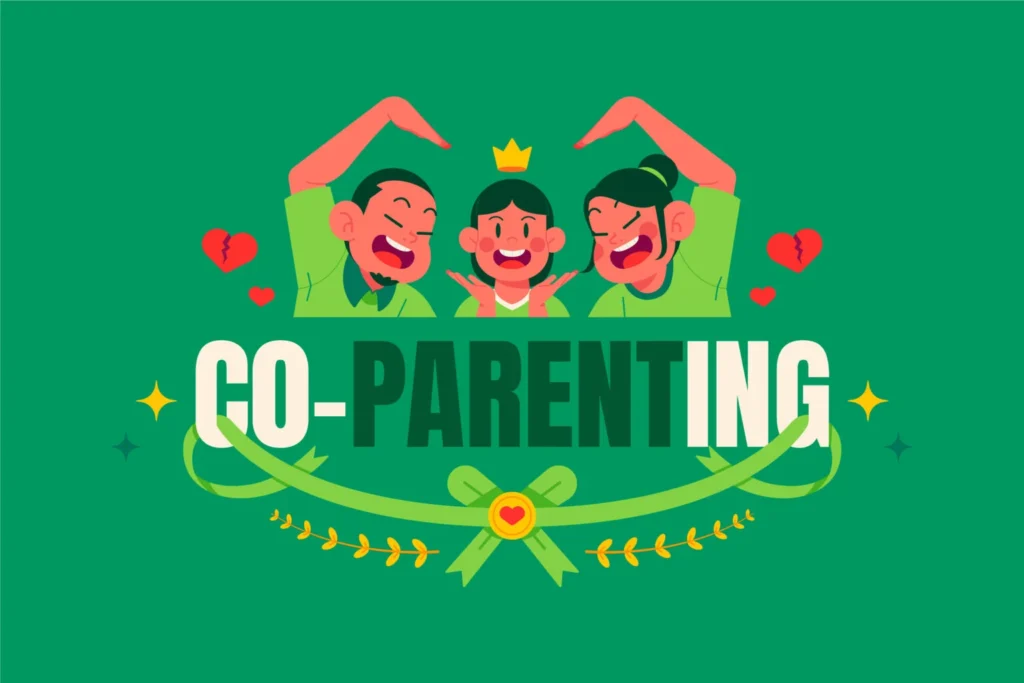Co-parenting is a vital aspect of raising children, especially after separation or divorce. Building and maintaining a positive relationship with your co-parent is essential for the well-being of your children and for fostering a harmonious family dynamic. In this blog post, we’ll explore strategies for cultivating strong relationships with your co-parent, focusing on effective communication, setting boundaries, prioritizing your children’s well-being, managing emotions, building a support network, and celebrating successes along the way.
Understanding Co-Parenting Dynamics
Co-parenting involves working together with your former partner to raise your children, regardless of your relationship status. It’s about putting aside personal differences and prioritizing the needs and interests of your children above all else. Positive co-parenting relationships can provide stability, consistency, and emotional support for your children, helping them adjust to changes in family dynamics more effectively.
Recognizing the benefits of positive co-parenting relationships is crucial for fostering cooperation and collaboration between you and your co-parent. By working together as a team, you can provide your children with the love, care, and support they need to thrive, even in challenging circumstances.
Effective Communication Strategies
Effective communication is key to successful co-parenting. Open and honest communication can help establish trust and transparency between you and your co-parent, reducing misunderstandings and conflicts. Practice active listening by seeking to understand your co-parent’s perspective and validating their feelings and concerns.
Conflict resolution skills are essential for navigating differences and disagreements constructively. Approach conflicts with a willingness to compromise and find mutually acceptable solutions that prioritize the well-being of your children. Remember that it’s okay to agree to disagree on certain issues as long as you can maintain a respectful and cooperative co-parenting relationship.
Setting Boundaries and Expectations
Setting clear boundaries and expectations is essential for establishing healthy co-parenting dynamics. Clarify roles and responsibilities to ensure that both you and your co-parent understand your respective obligations regarding childcare, decision-making, and communication. Respect each other’s space and privacy by setting boundaries around personal matters and avoiding unnecessary intrusions into each other’s lives.
Consider creating a co-parenting agreement outlining specific guidelines and expectations for co-parenting, such as schedules for visitation, communication protocols, and methods for resolving disputes. Having a written agreement can provide clarity and accountability, reducing misunderstandings and conflicts between you and your co-parent.
Prioritizing Your Children’s Well-Being
At the heart of co-parenting is the well-being of your children. When making decisions and interacting with your co-parent, always prioritize what is in the best interests of your children. This may require setting aside personal differences and collaborating with your co-parent to ensure that your children receive the love, support, and stability they need to thrive.
Consistency and stability are essential for children, especially during times of transition. Work together with your co-parent to provide a unified front and maintain consistent routines and expectations for your children across both households. By presenting a united front, you can minimize confusion and anxiety for your children and foster a sense of security and belonging.
If you and your co-parent are struggling to navigate challenging issues or conflicts, don’t hesitate to seek professional help. Co-parenting support services, such as mediation or counseling, can provide valuable guidance and assistance in resolving disputes and improving communication between you and your co-parent.
Managing Emotions and Coparenting Stress
Co-parenting can be emotionally challenging, especially if there are unresolved feelings or conflicts between you and your co-parent. It’s essential to prioritize self-care and develop healthy coping strategies for managing stress and difficult emotions.
Practice self-care regularly by engaging in activities that promote relaxation, stress relief, and emotional well-being. This may include exercise, meditation, spending time with loved ones, or pursuing hobbies and interests that bring you joy and fulfillment.
When faced with difficult emotions or coparenting challenges, take a step back and focus on what you can control. Practice mindfulness and self-awareness to stay grounded in the present moment and respond to situations with clarity and compassion rather than reacting impulsively out of anger or frustration.
Building resilience is also crucial for navigating the ups and downs of co-parenting. Cultivate a mindset of resilience by focusing on your strengths, seeking support from loved ones, and viewing challenges as opportunities for growth and learning. Remember that it’s okay to ask for help when needed and to lean on your support network for guidance and encouragement.
Building a Support Network
Building a support network of family, friends, and other co-parents can provide valuable encouragement and guidance as you navigate the complexities of co-parenting. Engage with family members and friends who are supportive of your co-parenting efforts and who can offer a listening ear or practical assistance when needed.
Consider joining support groups or online communities for co-parents, where you can connect with others who are facing similar challenges and share advice, resources, and encouragement. These groups can provide a sense of camaraderie and understanding, helping you feel less alone in your co-parenting journey.
Seeking professional help from therapists, mediators, or counselors can also be beneficial for improving communication and resolving conflicts with your co-parent. A trained professional can provide impartial guidance and support, helping you and your co-parent find common ground and work together more effectively.
Celebrating Successes and Milestones
In the often challenging landscape of co-parenting, it’s essential to acknowledge and celebrate the successes and milestones along the way. Every positive interaction, successful negotiation, and moment of cooperation is a step forward in building a strong co-parenting relationship and providing a supportive environment for your children.
Take the time to acknowledge and celebrate the progress you and your co-parent have made, no matter how small it may seem. Whether it’s successfully navigating a difficult conversation, reaching a compromise on a contentious issue, or simply maintaining a civil and respectful tone in your interactions, each achievement is worth recognizing and celebrating.
Reflect on the growth and improvement you’ve experienced in your co-parenting journey, both individually and together with your co-parent. Consider keeping a journal or log of your co-parenting successes and milestones, noting the progress you’ve made and the challenges you’ve overcome along the way. This can serve as a valuable reminder of how far you’ve come and provide motivation to continue building a positive co-parenting relationship.
Nurturing Strong Relationships with Your Co-Parent for the Long Term
Building strong relationships with your co-parent is an ongoing process that requires commitment, patience, and effort from both parties. It’s essential to approach co-parenting as a collaborative partnership focused on the well-being of your children and the shared goal of providing them with a loving and supportive environment to grow and thrive.
Maintain open lines of communication with your co-parent, even when faced with challenges or disagreements. Keep the lines of communication respectful, honest, and constructive, focusing on finding solutions rather than assigning blame or dwelling on past conflicts.
Continue to prioritize your children’s well-being above all else, making decisions and interacting with your co-parent with their best interests in mind. Remember that your children benefit most when they see their parents working together as a team, even in the face of adversity.
Stay flexible and adaptable in your co-parenting approach, recognizing that circumstances may change over time and require adjustments to your co-parenting arrangements. Be willing to compromise and negotiate with your co-parent in the spirit of cooperation and collaboration.
Finally, invest in nurturing your own well-being and emotional resilience as you navigate the complexities of co-parenting. Take care of yourself physically, mentally, and emotionally, seeking support from loved ones and professionals when needed.
Practical Strategies for Building and Maintaining Strong Relationships with Your Co-Parent
- Communicate Openly and Respectfully: Effective communication is the cornerstone of successful co-parenting. Keep lines of communication open, honest, and respectful, even in challenging situations. Practice active listening, express your thoughts and feelings calmly, and strive to understand your co-parent’s perspective.
- Establish Clear Expectations and Boundaries: Set clear expectations and boundaries regarding parenting responsibilities, schedules, and decision-making processes. Define roles and responsibilities upfront to avoid misunderstandings and conflicts down the road. Be willing to compromise and negotiate with your co-parent to find mutually acceptable solutions.
- Focus on the Best Interests of Your Children: Keep the best interests of your children at the forefront of your co-parenting relationship. Put aside personal differences and prioritize what’s best for your children’s physical, emotional, and developmental needs. Collaborate with your co-parent to create a nurturing and stable environment where your children can thrive.
- Practice Flexibility and Adaptability: Parenting is full of unexpected twists and turns, and flexibility is key to navigating challenges effectively. Be willing to adapt to changing circumstances, accommodate each other’s schedules and needs, and find creative solutions to parenting dilemmas. Approach co-parenting with a spirit of cooperation and flexibility, rather than rigidity and control.
- Respect Each Other’s Parenting Styles: Recognize and respect the differences in your co-parent’s parenting style, values, and beliefs. Avoid criticizing or undermining each other’s parenting decisions, and instead focus on finding common ground and working together as a team. Embrace diversity and celebrate the unique contributions that each parent brings to the parenting partnership.
- Stay Out of Arguments: Choose to disengage from arguments or conflicts that arise with your co-parent. Instead of escalating tensions, take a step back, and give yourself time to cool down before addressing the issue calmly and rationally. Practice active listening, validate each other’s feelings, and seek solutions collaboratively rather than engaging in blame or criticism.
- Practice Gratitude and Appreciation: Take time to express gratitude and appreciation for your co-parent’s efforts and contributions to your children’s lives. Acknowledge their strengths and positive qualities, and celebrate shared successes and milestones together. Cultivate a culture of kindness and appreciation in your co-parenting relationship, fostering mutual respect and goodwill.
- Seek Support and Guidance When Needed: Don’t hesitate to seek support and guidance from family members, friends, or professionals when navigating co-parenting challenges. Consider attending co-parenting counseling or mediation sessions to improve communication, resolve conflicts, and strengthen your co-parenting relationship. Remember that asking for help is a sign of strength, not weakness.
In conclusion, cultivating strong relationships with your co-parent is essential for the well-being of your children and for fostering a harmonious family dynamic. By practicing effective communication, setting boundaries and expectations, prioritizing your children’s well-being, managing emotions and co-parenting stress, building a support network, celebrating successes, and nurturing strong relationships with your co-parent for the long term, you can create a positive co-parenting environment that supports the growth and development of your children. Remember that co-parenting is a journey, and each step you take towards building a strong co-parenting relationship is an investment in the future well-being of your children.









